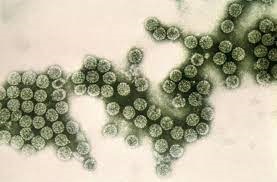BREAKING! Controversial Wuhan Lab Discovers A Novel DNA Virus In Rodents. The Virus Belongs To The Polyomaviruses Family That Can Cause Tumors In Humans!
Source: Medical News - New Novel Polyomavirus Sep 06, 2022 3 years, 5 months, 2 weeks, 1 day, 20 hours, 32 minutes ago
Interestingly, researchers from the infamous Wuhan Institute of Virology (WIV), (The centre of the various controversial hypotheses on the origins of the SARS-CoV-2 virus) have discovered a novel DNA virus found in small mammals like Lemniscomys species ie a type of grass mice or zebra mice that are mostly found in the African continent besides certain European and middle-eastern countries.

According to the study abstract, “Emergence and re-emergence of infectious diseases of wildlife origin have led pre-emptive pathogen surveillances in animals to be a public health priority.”
The study team said that rodents and shrews are among the most numerically abundant vertebrate taxa and are known as natural hosts of important zoonotic viruses. Many surveillance programs focused more on RNA viruses. In comparison, much less is known about DNA viruses harbored by these small mammals.
In order to fill this knowledge gap, the study team collected tissue specimens of 232 animals including 226 rodents, five shrews and one hedgehog from 5 counties in Kenya and tested for the presence of DNA viruses belonging to 7 viral families by PCR.
Diverse DNA sequences of adenoviruses, adeno-associated viruses, herpesviruses and polyomaviruses were detected. Phylogenetic analyses revealed that most of these viruses showed distinction from previously described viruses and formed new clusters.
However, the study team also discovered a novel DNA virus that was supported by the full-length genome characterization of a polyomavirus in Lemniscomys species.
This novel polyomavirus, named LsPyV KY187, has less than 60% amino acid sequence identity to the most related Glis glis polyomavirus 1 and Sciurus carolinensis polyomavirus 1 in both large and small T-antigen proteins and thus can be putatively allocated to a novel species within Betapolyomavirus.
The discovery was published in the peer reviewed journal: Virologica Sinica.
https://www.virosin.org/article/doi/10.1016/j.virs.2022.06.001
It should be noted that although the polyomaviruses identified is an animal virus, studies have shown that animal polyomaviruses when injected into other species including humans, can cause the rise of cancerous tumors!
https://www.frontiersin.org/articles/10.3389/fmicb.2022.834368/full
Human polyomaviruses are also known to cause cancers and tumors.
https://www.sciencedirect.com/science/article/pii/S1807593222011462
https://infectagentscancer.biomedcentral.com/articles/10.1186/s13027-021-00374-3
https://www.frontiersin.org/articles/10.3389/fmicb.2022.834368/full
https://journals.sagepub.com/doi/full/10.1177/1178122X17744785
Dr Sean Beckmann, Ph.D., assistant pro
fessor of biology at Stetson University in Florida, who was not involved in the study, told Thailand
Medical News, “The results of this study are important for our understanding of viruses and their evolution in non-human animals. However, these findings should be taken in context. None of the viruses identified, or the novel viruses, are known to be transmissible to humans, and the authors don’t make any claims about their pathogenicity.”
The study team emphasized that the study supports the need to continue studying rodent-borne viruses in East Africa.
Also, because the new virus does not appear to be closely related to any known pathogens, its effect on humans is “unclear and needs to be further assessed,” the researchers stated.
Dr Beckmann was equally cautious. He said, “The study findings are still valuable and important, but they shouldn’t be a cause for alarm that a bunch of new human pathogens have been found. Among the viruses that were identified, we don’t have any evidence of rodent to human transmission within those groups.”
Wuhan Institute of Virology in China is a leading research institute that focuses on viruses, but its possible association with the origins of COVID-19 has increased scrutiny of its operations. Also, the fact that Dr Anthony Fauci from the U.S. NIAID that is part of the U.S. NIH has been funding development costs and research at this institute from American tax payer’s monies and Bill Gates indirect involvement with the Institute has raised eyebrows among many.
Currently, there are two primary theories about the origin of COVID-19: the “lab-leak” theory and the “wet market” theory. The lab-leak theory argues the virus likely originated in bats, which were studied at the WIV, and then was accidentally released from the laboratory, possibly by an infected staffer. The wet market theory proposes that the virus originated in bats, moved to an intermediary animal at the Huanan Seafood Wholesale Market in Wuhan, and then to humans. The market is a few miles from the WIV.
Perhaps the researchers at the Wuhan Institute of Virology along with new funding from the United States and the big pharma companies might subject these new novel polyomaviruses to strategic serial passaging experiments to make them transmissible to humans and start yet another pandemic so as to eradicate more stupids in the world as the current SARS-CoV-2 virus and its emerging variants are taking a longer time to deplete the world of deplorables!
For more on P
olyomaviruses, keep on logging to Thailand
Medical News.
